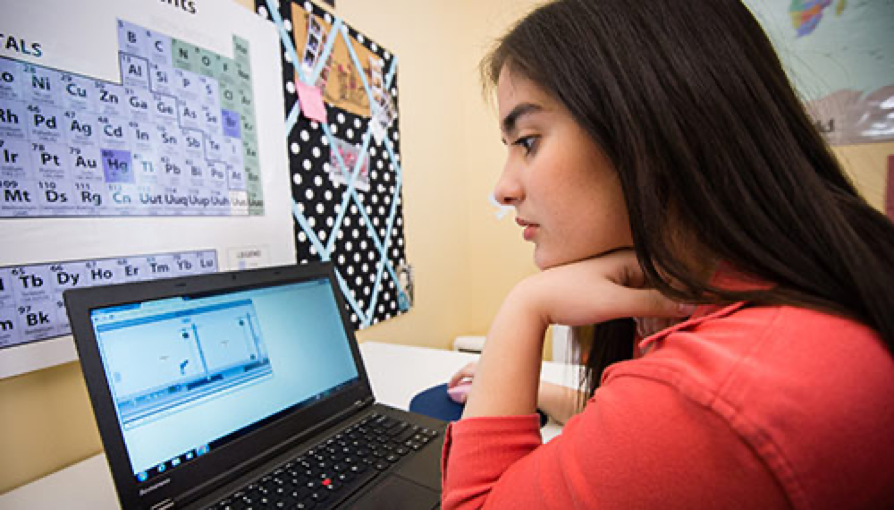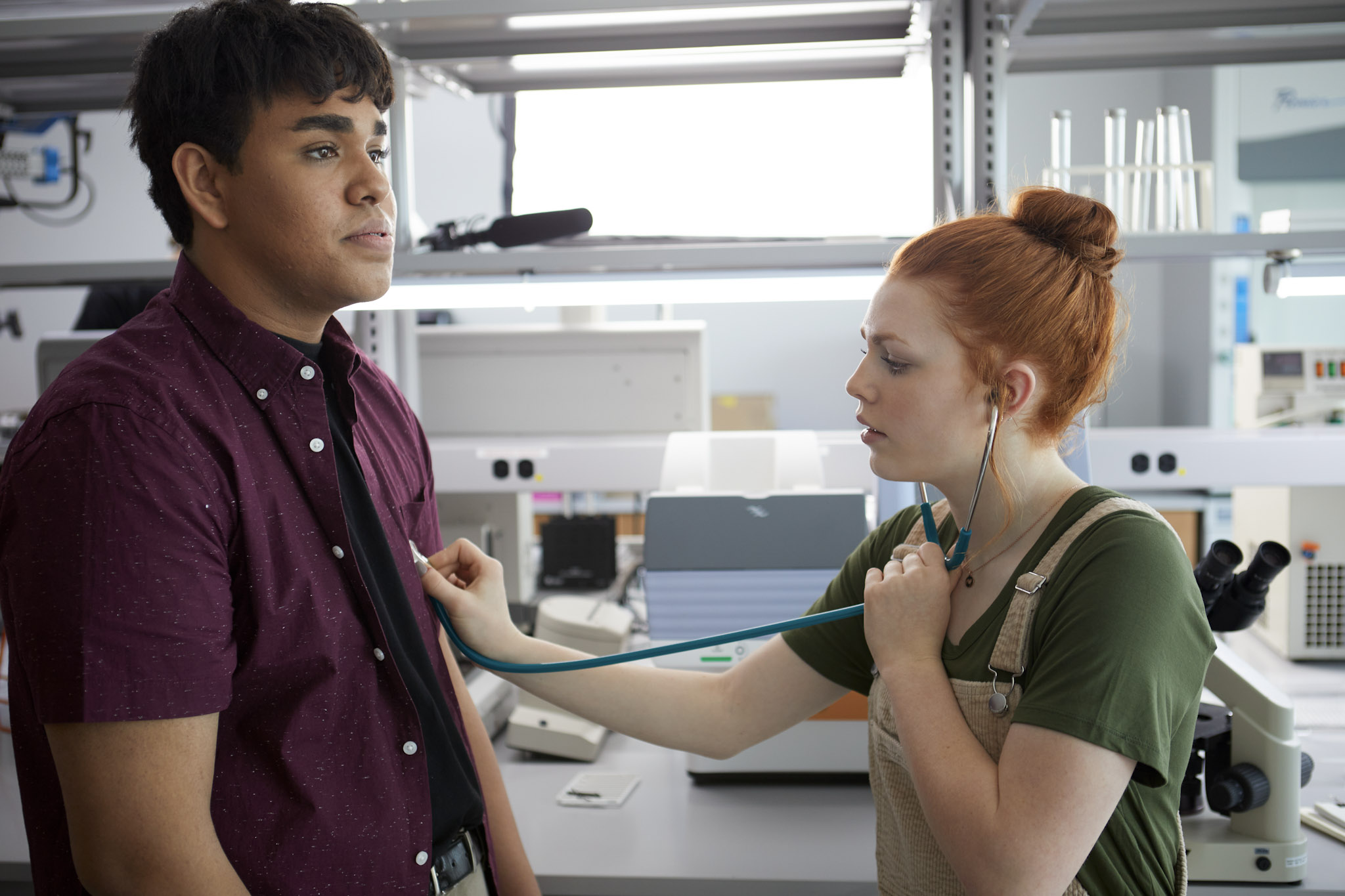Job Profile: Computer Programmer
Without computer programmers, our computers wouldn't be entertainment centers and problem solvers. The world as we know it would be completely different. When studying computer programming, students work with software developers to bring products to life. This can be in the form of writing code for digital products like apps and video games or physical products like self-driving cars.
Destinations Career Academy is a K12-powered career readiness program for high school that provides students with the opportunity to study computer programming while also getting their high school diploma. The Computer Programming pathway at Destinations prepares students for a future in IT and gives them a head start in their career. Think a career in computer programming is right for your student? Take a look at what they can expect.
A Day in the Life
Most computer programmers can expect to spend their day in an office, but more recently, working from home has become a more favored option. In fact, since 2005, there has been a 159% increase in remote work, and that number is expected to increase more rapidly in the future. Regardless of whether they are working from home or in an office, on a daily basis computer programmers can expect to:
Write the code prescribed by software developers
Test written code in pre-launch or development environments
Identify bugs and implement fixes needed in program code
Update and expand existing program code
One Job, Many Options
Does your student dream of working for Apple, Microsoft, or Google? Computer programming is one avenue that could get them there. Programmers typically work for software or digital service companies that include the big names as well as boutique firms that provide services at a smaller scale. Many businesses also need in-house programmers, especially financial institutions and manufacturers that require sophisticated and ever-changing intranet software. Since each programming project has an end-user, computer programmers must become familiar with the subject at hand. Working in-house can provide a more targeted and specialized approach, ensuring students gain necessary experience. For example, those creating healthcare management platforms should be familiar with the healthcare system. This knowledge may be either preferred or required by the hiring employer.
Becoming a Computer Programmer
The education requirements to become a computer programmer are a bit mixed. Today, the majority of computer programmers have bachelor's degrees in a related field. While a college education in computer science can be extremely useful, according to Burning Glass Technologies, there are about 500,000 job postings that don't require a bachelor's degree*. Instead, these jobs prefer applicants to have advanced coding language knowledge. The three languages that are most often required are all taught in K12's Destinations Career Academy program--Python, JAVA, and HTML5.
Computer programming is a highly competitive career field. In 2018, the median pay was $84,280, with the top 10 percent earning $134,630. As technology evolves and develops, staying up-to-date with current systems and languages helps computer programmers remain ahead of the curve in their industry.
Learning the Skills at Destinations
Body: Parents, bring us your techies, computer whizzes, and coding hobbyists! To find success in computer programming, students should be critical thinkers who master various coding languages. Destinations Career Academy gives students the resources they need to learn these skills and more. Students who show an interest in coding will be set up for success as a computer programmer through industry-experienced instructors, project-based learning, and immersive experiences such as live coding software.
Computer Programming Pathway
Body: At Destinations Career Academy, we set our students up for success early. Students have the option to just dip their toes in the Computer Programming pathway if it piques their interest or fully commit to the program for all four years. Through this pathway, students can expect to dive into:
IT Explorations (Project-Based Learning)
Computer Literacy (Project-Based Learning)
Computer Science
Python
Programming Logic and Design
Additional coding language classes, including JAVA, HTML3, CSS3
The Computer Programming pathway at Destinations prepares students to take industry-recognized certifications like the ACT, Certiport–Python, JAVA, C++, HTML5, CSS3. These and other certificates are must-haves for any candidate seeing a job in programming.
Technical Skills for Computer Programmers
Body: As you can imagine, technical skills are essential for success in computer programming. To perform even the most basic tasks, programmers must have advanced knowledge and fluency in coding languages. Burning Glass states the five most wanted skills for computer programmers as JAVA, Python, Networking, HTML5, and Web Design*. On top of these skills, students will want to develop the following:
Object-oriented programming
Understanding of database structures
Project management
Development processes such as Agile and Scrum
If it sounds like we're speaking another language, it's because we are. But rest assured that these skills are highly valuable. According to HackerRank's 2020 Developer Skills Report, 53.6% of companies are looking to hire programmers \proficient in Javascript, and 49.5% of companies are looking for programmers skilled in Python. Destinations Career Academy offers computer programming courses that teach both of these in-demand coding languages.
Professional Skills for Computer Programmers
Body: Wherever your student finds themselves working in the future, having the right professional skills will be as important as having the right technical skills. Students learn qualities like communication, teamwork, and a strong work ethic through many avenues such as sports, drama, and yes, even in online school.
Computer programming can be rigorous. It is common to spend days on a single task or trying to solve the same problem. With such unique job functions, your student may find more success in computer programming if they have the following skills:
Problem Solving
Analytical Thinking
Concentration and Patience
Being Detail-Oriented
Able to Troubleshoot
At Destinations, students use project-based learning to develop these skills. Through real-world challenges, students complete projects that hone specific skills. For example, a computer programming student may need to design software that completes a particular task (like a digital timer). In this instance, the student will need to use critical thinking and analytical skills to find an approach to the job.
Students work in teams to develop concepts that are then programmed using functions and coding tools. This allows students to learn not only the process but also the technical tools, user testing experience, and the satisfaction of a finished product. Concentration, attention to detail, and analytics all come into play as the student creates the code and fixes bugs found in troubleshooting.
Extracurriculars for Computer Programming Students
Similar to being in a traditional high school, Destinations offers clubs and resources to get students involved and connected with each other. However, at Destinations, these clubs are often career-focused. Our career technical service organizations (CTSOs) allow students to connect with other students or industry professionals to build their skills. Students can collaborate on coding projects and even compete in programming competitions. Destinations Career Academy also connects students with businesses so they can gain hands-on experience through opportunities* in job shadows, internships, and apprenticeships.
The Computer Programming pathway at Destinations is the perfect way for a student to lean into their digital interests. Students still take their typical high school courses like math, English, and science, but combine them with career-focused electives in the IT field. These courses, along with project-based learning, clubs, and access to industry professionals, give them a jump start in preparing for the future. Students can chart their own course for success through empowered and innovative learning.
*Burning Glass, 2019.
**Opportunities vary by school; please visit your school page or check with your school counselor.
Knowledge Library Categories
Discover More
Learn more about IT Career Readiness Education and K12’s innovative approach to empowering exploration.




